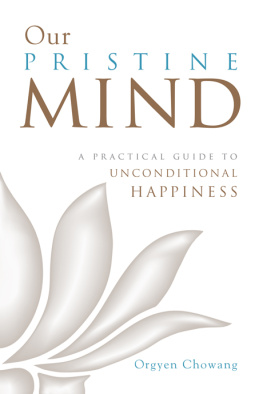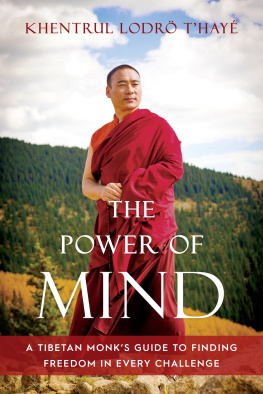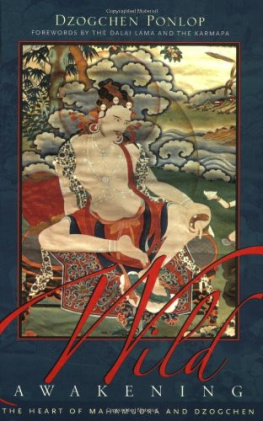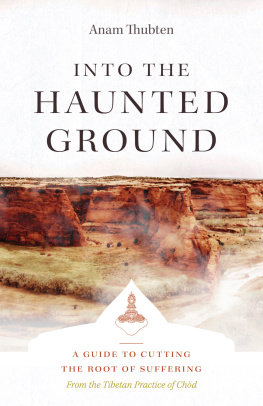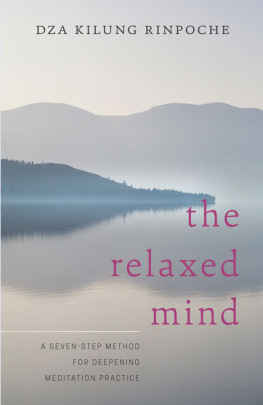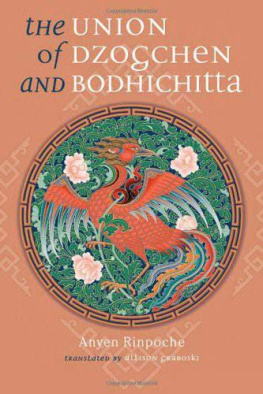Sign up to receive weekly Tibetan Dharma teachings and special offers from Shambhala Publications.

Or visit us online to sign up at shambhala.com/eshambhala.
O UR P RISTINE M IND
A PRACTICAL GUIDE TO UNCONDITIONAL HAPPINESS
Orgyen Chowang

S HAMBHALA
BOULDER
2016
Shambhala Publications, Inc.
4720 Walnut Street
Boulder, Colorado 80301
www.shambhala.com
2016 by Orgyen Chowang
Cover design by Pate International
Author photo by Stephanie Mohan
Pristine Mind is a registered trademark of Pristine Mind Foundation.
All rights reserved. No part of this book may be reproduced in any form or by any means, electronic or mechanical, including photocopying, recording, or by any information storage and retrieval system, without permission in writing from the publisher.
Library of Congress Cataloging-in-Publication Data
Chowang, Orgyen, author.
Our pristine mind: a practical guide to unconditional happiness / Orgyen Chowang.First edition.
pages cm
eISBN: 978-0-8348-4009-6
ISBN 978-1-61180-327-3 (paperback)
1. Meditation. 2. MeditationBuddhism. 3. Spiritual life. 4. Mind and body. 5. Happiness. I. Title.
BL627.C563 2016
294.3444dc23
2015027659
This book is dedicated and offered to my enlightened master, Jigme Phuntsok Rinpoche, who brought meaning, purpose, and happiness to my life.

O UR P RISTINE M IND is a practical guide to unconditional happiness. Experiencing our Pristine Mindwho we really areand thereby achieving true, unconditional happiness, is what this book is about. To introduce this profound, transformative path of experience to you, I would like to tell you first how this book came to exist. I hope that sharing my own journey with you will give you a deeper understanding of the journey you are about to undertake.
I spent my childhood in Eastern Tibet, in a small village. Oftentimes I found myself in the hills above the village, just gazing at the clear blue sky and the clouds passing by. I enjoyed that peaceful time, with my mind spacious and clear like the sky above.
At the age of fourteen I received the rare opportunity to become a student of one of the greatest enlightened masters of the twentieth century, Jigme Phuntsok Rinpoche. I left home and started my studies at Larung Gar, my teachers famous retreat center. The living conditions at Larung Gar at that time were harsh, with very cold winters, scanty food, and few comforts. For the first year I lived on my uncles porch, with only a curtain protecting me from the snow. After that, my parents built me a small house, where I stayed for the next eight years of my training. Even though the living conditions continued to be challenging, they never felt too difficult to bear. In fact, this was a time in my life when I experienced tremendous joy.
During these nine years, my focus was on studying the canon of Buddhist literature, particularly the advanced teachings known in Tibet as Vajrayana and Dzogchen. But my studies were not just dry reading and test taking, as you might imagine. I found great inspiration and joy through singing vajra songspoems that have arisen in the minds of enlightened masters out of their meditation experiences. These poems express extraordinary wisdom. After each day of class and study, I went back to my little house and sang many vajra songs, particularly those of the great masters Longchenpa (fourteenth century) and Mipham Rinpoche (nineteenth century).
After many years of study, I was given the title Khenpo, the rough equivalent of a Ph.D. It indicates having a full understanding of the Buddhist literature and also means having achieved some degree of meditation experience, so that I was qualified to give teachings and guide others in their practice as well. Overall, the training I received during these years gave me the knowledge and practical tools I needed in order to lead a life of fulfillment and transformation, for both myself and others. I embarked on a career in teaching. I was especially attracted to the idea of traveling and teaching in many places around the world.
A few years later I met Thinley Norbu Rinpoche, an extraordinary and highly esteemed teacher and author. We made a close connection, and I received teachings from him. In late 1995 he invited me to visit him in the United States. I spent about four months at his residence in upstate New York. Then I moved to Santa Cruz, California, to teach at the great yogi Lama Tharchin Rinpoches dharma center. When I first came to the United States, I only knew a few words of English, like hello and goodbye. Still, I was fascinated with meeting people and finding out about how they lived and how they viewed the world.
I ended up staying at Lama Tharchins center for three years. It was an exciting and interesting experience. I gave teachings at a shedra, or college of Buddhist studies, which ran for about a month every year, and I also gave informal teachings to students who lived there or visited from time to time. Some very good interpreters were provided to translate into English as I spoke Tibetan. During this time I learned more and more about how people speak and understand English.
The translators were very skilled. But despite their abilities, I didnt feel satisfied that the students were really getting what I was teaching. It wasnt the translators fault. The problem was really the way language works. For your listeners to get the true experience of what you teach, you need to have your own voiceyou need to select your own words and phrases, and not have someone else choose the words for you. No matter how good your translator is, if you dont personally choose your own words so as to say what you really mean, the translation will distort the meaning to some degree, and the meaning wont be received by the listeners in a clear and powerful way. So I thought a lot about how to deal with this problem.
In 1999 I moved to the San Francisco Bay Area. While living there, I gathered with students in the Napa Valley four times a year and taught meditation with an excellent translator. As I listened to peoples questions and my translators way of expressing my thoughts, I understood the English language more and more and realized how powerful it could be in conveying the teachings; but also I knew more and more that the full message of what I was trying to communicate wasnt really getting across. I needed to speak more directly with people and develop my own spiritual language in English.
So for the next few years, except for the Napa Valley retreats, I kept mostly to myself. Working with only one person, Josh Godine, as my assistant, I began writing a book. I still didnt speak English very well, yet I started to write a book in English! It was crazy, but I was determined. I told Josh that by publishing a book we could achieve two valuable goals: we could develop a very natural, experiential language for clearly expressing the teachings of meditation and, even more important, we could share these teachings effectively with others.
During this time, while I worked on that book, mostly I simply lived quietly at home, practicing meditation and deepening my meditation experience. Sometimes I went out to coffee shops and other public places to see how people spent their time. I watched TV newsnot so much for the news, but to improve my English and observe how people perceive themselves and the world. I spent some time with a few students. I pored over the texts I had studied during my training. I sang vajra songs.
Next page
